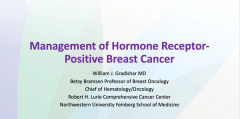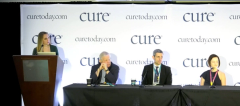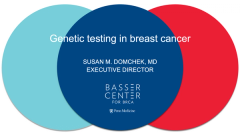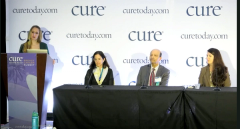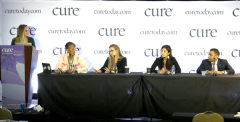
Educated Patient® Breast Cancer Summit at MBCC Circulating Tumor DNA Presentation: March 4, 2023
Watch Dr. Debu Tripathy, from The University of Texas MD Anderson Cancer Center, discuss circulating tumor DNA during the CURE Educated Patient® Breast Cancer Summit at MBCC.
Episodes in this series

Liquid biopsies — which detect traces of cancer DNA via a blood test — can provide important clues about breast cancer and the appropriate treatment for certain patients, though questions remain about the best way to use this testing and the data that it reveals, explained Dr. Debu Tripathy.
At CURE®’s Educated Patient® Breast Cancer Summit — held live and virtually at the Miami Breast Cancer Conference — Tripathy, who is a professor of Medicine and chair of the Department of Breast Medical Oncology at The University of Texas MD Anderson Cancer Center, as well as editor in chief of CURE®, discussed liquid biopsies and their use in the breast cancer space.
“We want to develop (this testing). Circulating-tumor DNA does have a future, but we need to design a clever and smart trial so that we know how to use the results,” Tripathy said in an interview with CURE®. “We hope that this field moves forward quickly so that we can offer, as we call it, a second chance for our patients.”
Liquid Biopsies Can Guide Treatment Decisions
Liquid biopsies are a type of blood test that provides information about cancer. In particular, it analyzes circulating tumor DNA to see if the cancer has any mutations that may be able to be targeted with specific drugs.
“In the last decade or so, we have been using the sequence of the tumor DNA because there are many mutations in most patients’ tumors,” Tripathy explained. “Some of these mutations actually guide growth of that cancer, and we now developed certain drugs against (the cancers of) patients who have certain mutations.”
While liquid biopsies can provide a wealth of information, they do not, unfortunately, provide all the information that patients and their clinicians would need. As such, tissue biopsies — which require taking out a small piece of the tumor and having it analyzed by a pathologist — is still the standard of care for patients with breast cancer.
Tissue biopsies provide information on whether or not the disease is actually breast cancer (rather than cancer that originated elsewhere and moved to the breast), as well as the hormone-receptor and HER2-status of the disease — both of which could guide treatment options as well.
“So for now, you need both (liquid and tissue biopsies), but we think that at some point, blood tests might tell us everything,” Tripathy said. “But it doesn’t at this point; there’s still a role for both tissue- and blood-based (biopsies).”
A Potential to Predict Recurrence Early
Tripathy explained that liquid biopsies are most commonly used to help determine breast cancer treatment. However, a newer use of the procedure involves detecting cancer recurrence earlier in patients with early-stage disease.
“This new scenario is where a patient has been followed for early stage and we're looking for mutations that were in that original tumor using circulating tumor DNA,” he said. “And this is an issue now because the data that supports the fact that when you see this, there is a risk that is relatively new, and we still don't know what to do with the results.”
If a patient has traces of circulating tumor DNA in their blood test, clinicians will most likely order a scan to see if there is, indeed, a cancer recurrence that can be treated. However, since the liquid biopsy can detect smaller traces of cancer than PET or CT scans can, patients may know that they’re at higher risk of recurrence based on their liquid biopsy results, but not have a clear plan on what to do next.
“This can cause a lot of stress, as you can imagine,” Tripathy said. “We know from the existing information that we have that it does put you at a higher risk for actually developing a true metastasis that we can see on a scan. So the only thing (clinicians) really have to offer the patient at that time is to monitor them and maybe scan again in the future.”
More information for the optimal use of liquid biopsies will be determined by ongoing and future clinical trials, according to Tripathy.
“At this point in time, there are clinical trials that are being designed where we will ask patients for circulating tumor DNA. We will now treat them with an experimental treatment or a drug that's already approved, but not really indicated in that situation. … And then we would follow the circulating tumor DNA itself and see if the levels go down to see if (the experimental drugs) might be effective,” he said. “But again, the only way we'll know that we're helping patients with this early detection is by following them over time and seeing who develops recurrences, and can we prevent some of these recurrences or delay them.”
For more news on cancer updates, research and education, don’t forget to




